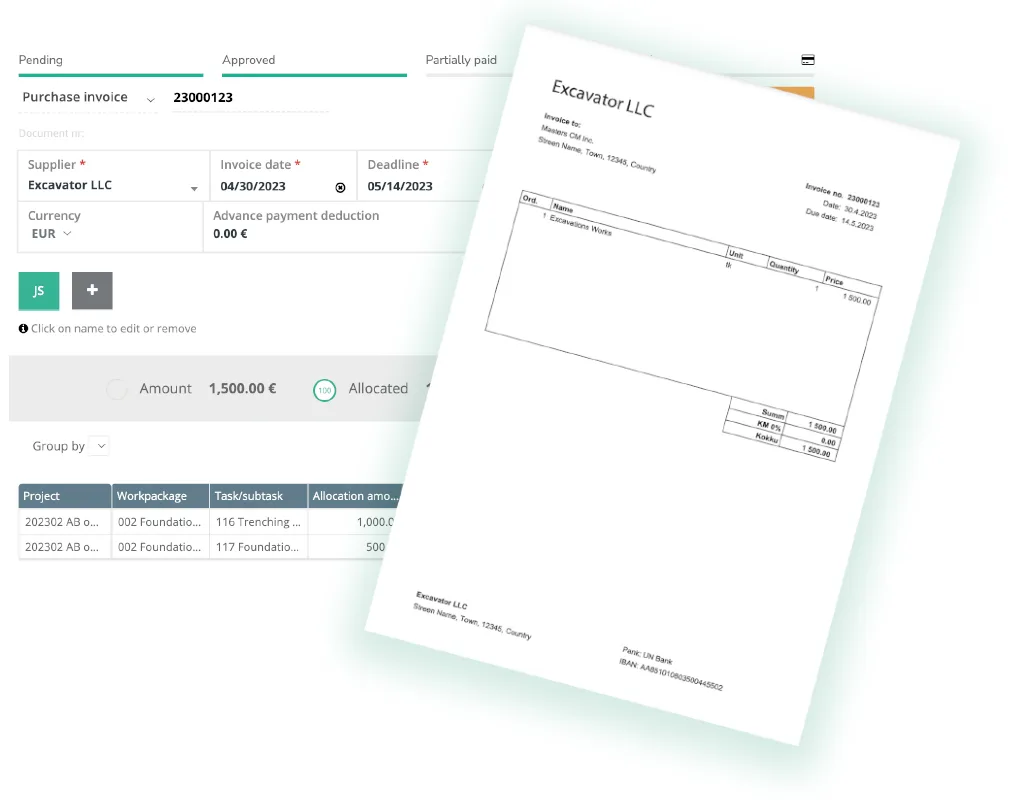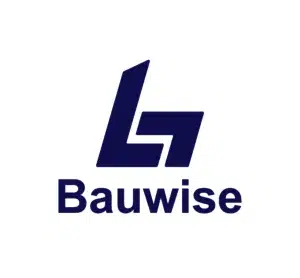In the construction line, you likely process hundreds of invoices throughout the lifespan of a single project, not to mention thousands across your entire organization at any one time. Things can quickly get out of hand without the tools to help streamline generation, automate billing, manage documentation, and consolidate them with the rest of your financials.
Not investing in your construction invoicing can lead to delayed payments, human errors, and a lack of compliance with the necessary standards (AIA, EN 16931, or the EU VAT Directive, for example). The knock-on effect may strain your cash flow, lead to organizational confusion, or affect project profitability.
Construction businesses also have to worry about retainage, change orders, or progress billing, which further complicate invoicing. That’s why it’s important to identify specialist construction invoicing management software, which is designed to solve the unique challenges in this space.
Below, you’ll find a roundup of the best invoice management tools for construction businesses and some guidance on how to select the best one for your unique needs:
Table of Contents
1. Bauwise
Bauwise is an established brand in the construction management software industry, with a high-tech ecosystem of tools that includes AI-driven invoicing. They aim to help contractors drastically reduce manual operations through capabilities like bill scanning as well as automated data capture, PO matching, and duplicate-checking
Simultaneously, real-time budget forecasting and comparisons and cash flow alerts mitigate the risk of not following up on payments in time, before it has a tangible impact on your projects.
It’s also a true all-in-one cost management solution for your entire budget, including tools to help manage subcontractors and change orders, make forecasts, and keep a handle on your expenses.
Key Features:
- AI-powered invoicing tools, including bill scanning, data capture, PO matching, and more.
- Create customizable approval workflows to streamline billing processes with one or multiple final approvers
- Advanced search and filter tools make finding invoices or related records quick and easy.
- Automatically flags potential cash flow issues by comparing committed costs, invoices, and budget forecasts.
Pros:
- Seamless invoice allocations across projects and your budget.
- Powerful document management and collaboration tools.
- Broad integration coverage with finance and business apps.
- Designed with EU construction standards in mind (e.g., VAT and e-invoicing rules)
Cons:
- Quote by quote pricing only — no fixed plans
Reviews:
“What I like most about Bauwise is the flexibility. Both Bauwise as a system and as a team has been very flexible in relation to fit the use of Bauwise to our specific needs. The Bauwise team has been an excellent sparring partner in the setup and implementation of Bauwise.”
“I am using Bauwise in Spain and it is super helpful in terms of managing realtime costs and the budget, keeping the payment information about invoices up-to-date and etc. Highly recommended for professional developers and main contractors!”
— Raido Pärn CEO
2. Jonas Construction
Jonas Construction is ERP software designed with the specific requirements of contractors, such as mid-to-large-sized mechanical, HVAC, plumbing, electrical, and specialty contractors, as well as construction companies, in mind. It goes beyond just invoicing, as a full-service package to unify all construction back-office operations, such as accounting & payroll, project management, and analytics & reporting.
You can thus expect a seamless integration between your invoicing processes and your wider construction management platform. It also comes with everything you need, from customer invoicing to progress billing to service-related invoicing to job costing.
Based out of Ontario, Canada, Jonas has been around for a long time, with regional representation in the UK as well.
Key Features:
- All-in-one construction and service software focused on a variety of contractor types.
- Handles AIA-style forms and retainage tracking according to industry-standard billing structures.
- Automatically ties invoices to job cost codes for accurate, real-time cost allocation and financial tracking.
Pros:
- Highly-rated customer support from existing and past clients
- User-friendly and convenient cloud platform
- Highly detailed cost reporting tools
Cons:
- Still some reliance on manual tools like Word or spreadsheets for data entry
- Not invested in AI capabilities or features
Reviews:
“Very user friendly for our business, we really enjoy the superb customer service and their case logging system for issues is a well oiled machine. The training our company has encountered has been very helpful also.”
“Unable to create quotes for clients without having to create a work order first. We have to create the quotes on Word.”
3. Buildern
Buildern is a complete construction management platform, aimed specifically at builders. As part of its impressive suite of features, it offers comprehensive financial tools packaged into a neatly organized and modern platform.
The platform has started investing in AI, but it’s still on its way to maturity. The good news is that it currently features AI-powered billing, helping to eliminate human error from one of the key day-to-day invoicing operations.
Overall, it has strong focus on streamlining invoice generation with built-in standards compliance and quick-action tools.
Key Features:
- Scan bill documents and use AI for automated invoice generation, data extraction, and PO matching.
- Seamless integration with accounting software like Quickbooks and Xero.
- Ensures compliance with industry standards, following G702, G703, and SOV formats
- End-to-end platform with robust pre-sales tracking and CRM capabilities.
Pros:
- Some existing AI features with more likely to come.
- Easy invoice status tracking with color-coded labels.
- Exceptionally modern and intuitive interface.
- One of the few platforms with transparent, upfront pricing.
Cons:
- Platform is still growing, with some features missing or needing refinements.
- Might be too costly for some entry-level businesses.
Reviews:
“…my favourite thing about Buildern is their ability to genuinely listen to user feedback and quickly implement changes & updates. There has been alot feedback that I have provided to Buildern and they have pretty much implemented nearly every single suggestion I have made which has only made the software better for everyone.”
“Despite Buildern delivering on the needs I have ,there is need for some features to be polished to make them more competent such as combination of timesheets into Xero.”
4. Procore
With a global presence in the construction management software industry, Procore is one of the leaders of the field. Its extensive platform already benefits greatly from its AI-based intelligence layer, called Procore Helix, automating routine tasks and powering analytics.
While AI is not heavily involved in their invoicing toolkit yet, it should only be a matter of time. One of the standout characteristics of its invoicing system is the clear visibility it gives builders to ensure things like that subcontractors have actually completed the work for which they are requesting payment.
It also features powerful workflows for collaborative billing approvals to speed up high-volume tasks.
Key Features:
- Built-in tools to manage retainage and keep billing compliant with standard construction payment practices.
- Individual tools for both owner and subcontractor invoicing, separating concerns.
- One of the most extensive integration libraries, officially supporting over 500 apps.
- Links invoices directly to contracts, commitments, and change orders, ensuring billing aligns with approved project scope.
Pros:
- An interface that’s both intuitive and familiar to users of other software.
- Strong support for remote collaboration with field agents.
- Great organization-wide visibility and project management.
Cons:
- There are better options for small-to-mid-size builders
- Many users report software performance issues
Reviews:
“It allows you to control multiple projects from the same company. View their status and progress in an easy and interactive way. You can interact with your contractor by assigning them specific tasks related to each project.”
“Due to the complexity of multiple modules, I think it can be hard to learn and this hinders implementation. It does a lot, but you have to do a lot of research to figure it out.”
5. Joist
Joist is not specifically focused on the construction industry. However, this is not necessarily a con, as its focus on delivering essential invoicing tools in an accessible way allows it to be extremely affordable.
For example, invoices don’t feature “Project/Job Name fields, which is pretty standard practice for construction invoicing. It also doesn’t really have dedicated tools to handle progress billing, retainage, or change orders.
However, the platform is used by over 1.3 million contractors, with many being drawn to its low costs and simplicity.
Key Features:
- Strong native support to handle invoicing on mobile devices, like iPad, iPhone, Android, and the web.
- Easy to set up and collect “milestone” payments for invoices billed in phases.
- In-app signatures enable you to sign and collect invoices from customers on the go.
Pros:
- Simple and streamlined invoicing processes.
- Robust and intuitive estimation tools.
Cons:
- Not tailored for construction, missing industry-specific tools.
- Invoices need more field flexibility and improved searching.
Reviews:
“The most helpful in using Joist is that you can easily invoice our clients. I haven’t had any errors as well when using this tool. Also, it’s way faster, efficient and accurate when making an invoice.”
“I don’t like that I can’t search for estimates or invoices via line items or words in them. It makes it more time consuming to find an older estimate that I may need to pull up.”
How to Choose the Right Construction Invoice Management Software
As you probably already realize, managing invoicing for a construction company is no simple task. So, it wouldn’t do it justice to simplify the software acquisition process by saying that one software is best for all businesses.
To help tackle the problems today and grow with your business, however, your solution should at least have basic versions of the following features. However, the complexity and scalability depend on your unique circumstances:
- Automated Invoice & Progress Billing: Automate invoice generation using data points like project data, labor hours, materials, and progress milestones to minimize manual work and errors.
- Seamless Estimate-to-Invoice Conversion: Convert estimates or proposals directly into invoices in one click to eliminate duplicate data entry.
- Integration With Tech Stack: Sync with project management, scheduling, accounting software, CRM, and other business tools to align invoicing with your project progress, contact book, and shifting deadlines.
- Document & Receipt Management: Upload and store supporting documents (receipts, contracts, photos) and capture digital receipts via mobile to centralize audit trails.
- Mobile Accessibility: Mobile apps enable invoice creation, reminders, and payments directly from the job site, and to keep geographically separated offices aligned.
- Automated Reminders & Payment Tracking: Automatically scheduled reminders reduce late payments and improve cash flow.
- Templates & Customization: Use pre-built and customizable invoice templates tailored for construction (e.g., job-cost breakdowns, contract phases).
- Forecasting, Analytics & Reporting: Get team-wide financial clarity with pipeline forecasts, AR aging, retainage tracking, and profitability reports..
FAQs
What is construction invoice management software?
Invoice management software helps with essential processes like billing, tracking payments, and reconciling invoicing with accounting. Construction invoicing software has to fill additional roles unique to the industry, such as progress billing, retainage, and change orders, as well.
It may be a standalone software, but it is typically part of a larger construction ERP or construction management software system. Within the context of your overall project management ecosystem, it also helps automate tasks like matching purchase orders to invoices, tracking subcontractor payments, and integrating with accounting systems.
Construction invoice management vs accounting software: What’s the difference?
Accounting software records and reconciles financial transactions (e.g., payroll, taxes, and vendor payments) at the business level. In contrast, invoice management software focuses specifically on project-level billing — progress billing, retainage, and tracking what subcontractors are owed versus what clients owe you.
Instead of falling “under” accounting, invoicing and accounting are both pillars of your overall financial administration. There is some overlap when it comes to accounts receivable/payable, but workflows and approvals are generally distinct from each other.
How much does construction invoice management software cost?
Pricing varies widely depending on company size, number of users, and whether it’s a full ERP or standalone invoicing solution. Small contractors may find free (with very limited, mostly manual tools) or low-cost options (under $100/month), like Joist, with plans starting at $8/month.
Mid-to-large firms can expect $300–$1,000+ per month, like Buildern, for example.
However, generally speaking, most comprehensive construction management software with integrated invoicing tools is priced on a quote-by-quote basis. That’s because the scale and needs of constructors can vary greatly, making it hard to box them into concrete plans.
Options like Bauwise work closely with customers to ensure that they deliver a solution that’s tailored to their requirements.
Conclusion
Invoicing is literally the lifeline of your construction business, so it’s not something you can afford to get out of your control.
Luckily, there exist many competent solutions with all the tools you need to take charge of your invoicing, ensuring on-time payments, positive cash flows, and minimal headache-inducing errors.
With our curated list of the top construction invoice management software solutions and buying guide, you’re well-informed to make the right investment for your business.
While all of them have their pros and cons, we stand by Bauwise as one of the leading solutions out there for construction businesses of all shapes and sizes. We help solve the most persistent invoicing challenges of today, while looking to the future with AI-powered capabilities that will save you even more time and money.
Partner with Bauwise, and see how we’ll help keep your projects profitable and cash flow steady.
About the Author

Taavi Kaiv
Taavi Kaiv is a construction specialist with over ten years of experience in the construction industry. Taavi is an accomplished construction project manager with many successful projects that have been completed under his guidance. Taavi holds a master’s degree in construction management from the Tallinn University of Technology. View profile





